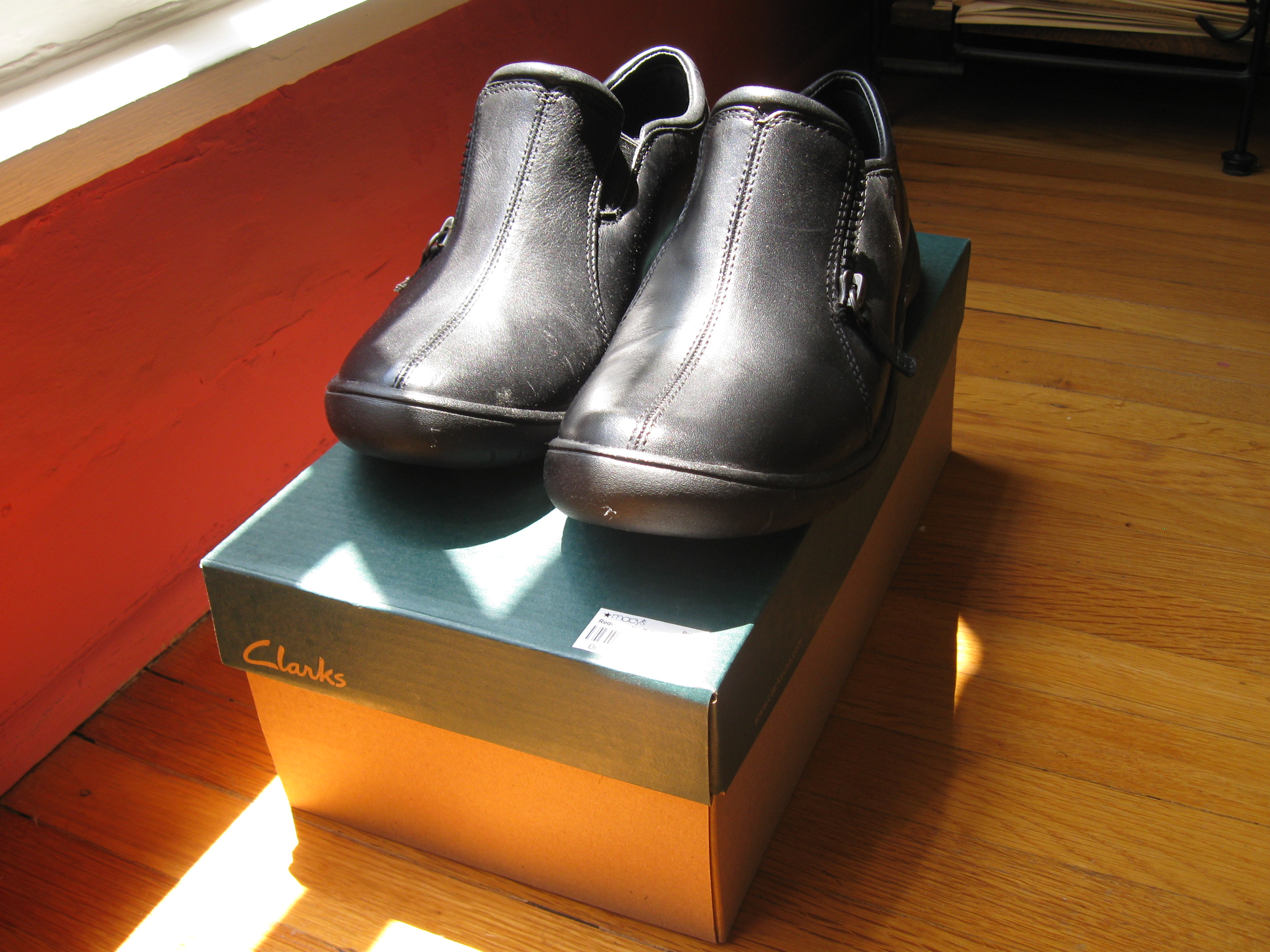An uplifting story about a woman who found the courage to leave an abusive marriage after two years of enduring unimaginable violence against her.

A pair of news shoes is a symbol of celebration—marking her courage to walk away from an abusive marriage and to “stand on my own two feet.” El Nuevo Sol Archive.
EL NUEVO SOL
Every year on Nov. 27, the date of her wedding anniversary, Lourdes Navarro, 40, purchases a new pair of shoes. It is not a matter of embellishing her wardrobe. Rather, it is a symbol of celebration—marking her courage to walk away from an abusive marriage and to “stand on my own two feet.”
At the vibrant age of 20, just three years after migrating with her family to the United States from Guadalajara, Mexico, Navarro exchanged wedding vows with the man she met and fell in love with. Her husband, who had been a second generation Mexican American, had never shown signs of violence during their courtship.
Growing up in a very close-knit family where she had always been protected, Navarro suddenly found herself amidst the dangers and “realities of the world.”
“You do not belong to your family anymore, you belong to me,” are the words her husband uttered one week after their wedding as he slapped her across the face while driving to her mother’s house for dinner. It had been his way of showing her that from that moment on he would be in charge.
After the initial shock had subsided, Navarro convinced herself that he did not mean to hurt her and that it would be the last time he would ever strike her, but she had been wrong.
Two days later he struck again. From then on, the abuse slowly escalated. The random slaps turned into hair-pulling, which led to pushing and then to occasional beatings. The severity of the abuse depended on how much alcohol he had consumed earlier.
Navarro became pregnant just two months after they had been married. She had experienced complications in the first stages of her pregnancy. The obstetrician advised her to terminate the pregnancy for heath reasons. Navarro refused. After returning home from their doctor’s appointment, her husband beat her until her body had been sprawled on the floor and unable to move.
“He said that I had undermined and embarrassed him in front of the doctor and that I would learn my lesson,” said Navarro. “Apparently, I used to be a slow learner because the abuse not only continued but became more brutal throughout my pregnancy.”
Any time Navarro voiced her opinions or thoughts during his drunken episodes, it would provoke violence. He had blamed her and said that she made him do these things.
“After a while you just end up believing that it is your fault,” said Navarro. “Your confidence is shattered and your faith is destroyed. You do not think about the outside support or about ways to leave. You just start believing that you are nothing and only become clever at concealing.”
During that time, Navarro worked as a full-time cashier at her family’s meat market grocery store. He threatened her to never tell her family. She felt that she had no other choice but to withhold from communicating any of the abuse to her family.
During her pregnancy, Navarro focused on two goals: “that he would not hurt my baby and that my family would not find out.” At times she would avoid seeing her family or would give the “I fell” excuse.
Navarro taught herself defense mechanisms to protect her belly. “I would curl up in a ball so that he would not kick my stomach.” Among these things she also learned how to dress to hide the black and blue marks on her body and how to apply make-up to cover the bruises on her face. “To this day, I still wear long sleeve shirts,” said Navarro.
There had been times where she would lock herself in the bathroom, but he managed to break the door down. “Eventually, I just stopped trying to run or hide,” said Navarro.
Many times Navarro questioned if marriage was supposed to be this way. She came from another country. She had still been learning English. She did not know if it had been stupidity or had she just been a naïve soul because of the sheltered life she lived prior to marriage.
With both Navarro and her husband working full-time, she always wondered why there had never been enough money to make ends meet. She continued to work everyday and gave all her earnings to her husband, even after her obgyn put her on bed rest. “I had to put dinner on the table.”
Every morning her husband would wake up, shower and dress in a suit and tie for work. He would drop her off at her job and leave. At the end of the day, he would pick her up and they would drive home together. During dinner he would share detailed stories about his day, his manager and coworkers.
Navarro had been under a great amount of stress. Seven months into her pregnancy she began to experience contractions after tripping and falling while walking home. She called the work number her husband gave her and found out that no one by his name worked there. It turned out that her husband never worked a day during their marriage. “Everything he told me had been a lie.”
Two weeks later, Navarro gave birth to a baby girl. When she had been discharged from the hospital, she stayed with her mother for about three weeks.
Before taking the baby home, Navarro went back to clean the house. She knew that her husband had friends over while she had been staying with her mother. She found bags of baking soda and cut up straws in the kitchen, the bathroom and in the bedroom. “It did not make sense… why would he leave bags of baking soda all over the house?” She threw everything in the trash.
When Navarro’s husband came home later that day, the first thing he inquired about had been the bags. “He ransacked the house looking for them,” said Navarro.
Navarro had never been exposed to drugs, but in that moment “I realized what had been in the bags.” That night her husband gave the worst beating she had experienced in their marriage. She could not move for several hours. Her mother kept calling the house because it had been time for the baby’s feeding.
Eventually Navarro made it back to her mothers to pick up her daughter. Her mother had noticed that she had been crying. Navarro insisted, “I am just tired.”
The thought of returning home had terrified her now she had her daughter to think about. At times she believed “the baby might help change things.”
The violence only became more vicious when her husband asked for a shotgun from his parents for Christmas, claiming that there had been some neighborhood robberies and that he needed it to protect his family.
“I never knew if the gun had been loaded when he frequently pointed the gun at me just to instill more fear in me,” said Navarro.
After her husband received the shotgun, she found out about a nearby shelter from a bulletin board a local church she occasionally visited “to hide from the world.” Shortly after, Navarro learned about the Battered Woman’s Syndrome, which according to Amanecer Community Counseling Services, is a woman’s “legal self-defense response to violence.”
A week following her daughter’s first birthday, Navarro’s husband pointed the shot gun at her and made her take off her clothes, except for her “bra and panties” and kicked her outside of the house and locked the door.
“I begged and pleaded for him to let me in. I did not feel the physical pain anymore, just the humiliation and anger…anger at the world, anger at her husband, anger at the system…anger, so much anger,” said Navarro.
Eventually he let her back in. He beat her and raped her and passed out from being so drunk. “That moment I thought about the Battered Woman’s Syndrome. I grabbed the gun and pointed it at him after I made sure it had been loaded,” said Navarro. “I had been zoned out and had my defense ready.”
“By the grace of God,” Navarro immediately snapped out of it the second she heard her daughter’s cry from the other room. Although Navarro knew that could prove she had been battered, in that moment she could only “picture my daughter alone in this world, a dead father, a mother in prison and his family gaining full custody of my daughter.”
Navarro experienced a normal morning after a violent night, “very quiet.” She would shower and dress for work, her husband would drop her off at her mother’s house who would watch their daughter. She took her daughter inside her mother’s house. She asked her mother to stand outside as she walked towards the car to tell her husband to “leave and never come back.”
It had been Navarro’s first attempt to leave her husband and she succeeded, which is rare in most domestic violence cases.
“The average abused woman leaves her abuser seven to eight times before she leaves permanently,” said Debi Biederman, clinician for the Family Violence Project of the Jewish Family Service of Los Angeles. Victims of abuse often live in a state of fear, confusion, and overwhelming sadness. To make a successful and permanent separation from an abuser, a woman needs support and easy access to organizations dedicated to aiding victims of abuse. With this support and the understanding that the abuse will continue if they return, many abused women are able to leave abusive relationships permanently.
Navarro found solace in the belief that it had been her faith, determination, resilience and the desire to be a good role model for her daughter and to “provide the opposite of the life I had been handed and almost created for my daughter.”
Every year on Nov. 27, the date of her wedding anniversary, Navarro purchases a new pair of shoes. “I love shoes and it makes me feel liberated knowing that I am walking my life without him.”
Tags: Amanecer Community Counseling Services Debi Biederman Domestic Violence Jewish Family Services of Los Angeles Summer H. Irby












